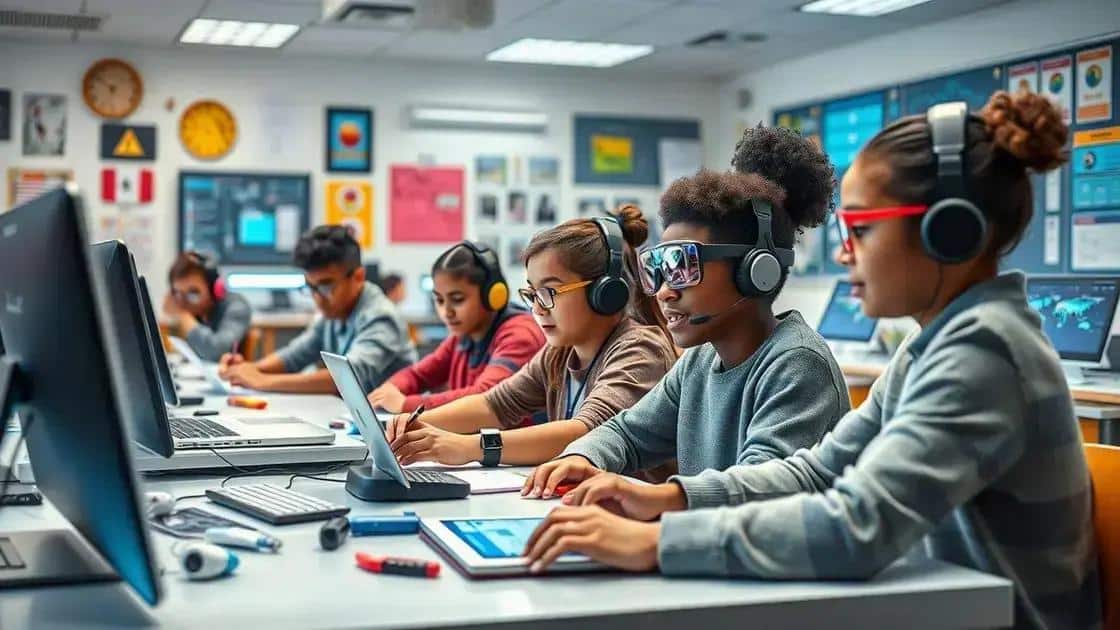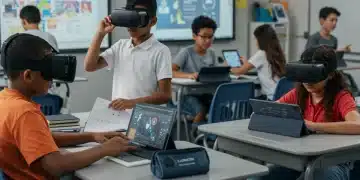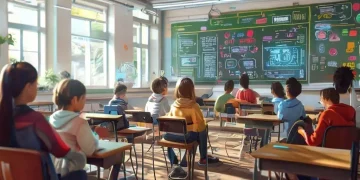Insights on ai in classrooms: exploring its impact

AI in classrooms enhances personalized learning by analyzing student data, automating administrative tasks, and providing instant feedback, while ensuring engagement and addressing ethical concerns like data privacy.
Insights on ai in classrooms show how this technology is changing the educational landscape. Have you considered how it can enhance learning for students of all ages? In this article, we dive into the transformative effects of AI in education.
The role of ai in modern education
In today’s educational landscape, the role of AI in modern education is more significant than ever. Schools are turning to artificial intelligence to enhance the learning experience. It allows teachers to tailor their lessons to meet individual student needs, making education more effective and engaging.
Benefits of AI in Education
AI transforms the classroom through various benefits. Here are a few key points:
- Personalized learning: AI systems can track student progress and adapt lessons accordingly.
- Automation of administrative tasks: Teachers can save time on grading and paperwork.
- Engagement through technology: Interactive tools make learning fun and appealing.
Moreover, AI provides students with instant feedback, allowing them to understand concepts better. This immediate response fosters a supportive environment where learners can thrive.
AI Tools for Today’s Classrooms
Several AI tools are reshaping education. Some notable examples include:
- Intelligent tutoring systems: These adapt to students’ needs and provide personalized assistance.
- AI-driven assessment tools: They enable efficient evaluation of student work, providing insights into their strengths and weaknesses.
- Learning management systems (LMS): AI enhances these platforms to organize and deliver content seamlessly.
As these technologies become more integrated, teachers play a vital role in guiding students. They are not replaced by AI, but rather augmented in their efforts to foster deeper understanding.
In conclusion, the role of AI in modern education is undeniable. By leveraging these innovations, educational institutions can significantly enhance the quality of learning and teaching.
How ai personalizes learning experiences

AI plays a crucial role in how educators personalize learning experiences for students. By analyzing data, AI tools can create tailored educational pathways that suit individual learning styles and paces. This ensures that every student receives a customized approach to their education.
Individualized Learning Plans
The use of AI allows educators to develop individualized learning plans for each student. These plans are based on assessments and students’ previous performances. As a result, learners can progress at their own speed, focusing on areas where they need improvement.
- Data analysis: AI systems analyze past performance to identify strengths and weaknesses.
- Adaptive lessons: Content is adjusted in real-time to meet student needs.
- Student engagement: Tailored content keeps students motivated and involved.
This level of personalization helps address the diverse needs present in a classroom. Additionally, as students engage with tailored materials, they become more invested in their learning journey.
Feedback and Assessment
Another significant advantage of AI is its ability to provide real-time feedback. With the help of AI technologies, assessments can be quick and efficient. Students receive instant responses, enabling them to learn from mistakes immediately. This timely feedback loops back into the learning process, enhancing comprehension.
Further, teachers gain insights into which concepts need more teaching focus, allowing for targeted instruction. This collaborative approach between AI technology and educators creates a dynamic learning environment that continually evolves.
By understanding how AI personalizes learning experiences, we can see its potential to enhance education. Ultimately, personalized learning helps create engaged, confident learners ready to succeed.
Challenges of integrating ai in classrooms
Integrating AI in classrooms brings many challenges that educators and institutions must navigate. Despite the potential benefits, several obstacles can hinder successful implementation. Understanding these difficulties is essential for effective use of AI in education.
Technical Issues
Technical challenges are among the most common barriers to AI integration. Schools may lack the necessary infrastructure to support advanced technologies. This includes limited access to high-speed internet and outdated hardware. Without proper tools, deploying AI effectively becomes nearly impossible.
- Insufficient resources: Schools need funding for new technology and training.
- Software compatibility: Existing systems may not integrate with new AI tools.
- Maintenance: Ongoing support is required to ensure smooth operation.
Additionally, teachers may feel overwhelmed by the need to learn new systems quickly, which can lead to implementation delays. Without adequate training, teachers might struggle to utilize AI effectively.
Ethical Concerns
Ethical considerations also pose challenges. Privacy concerns arise when collecting data from students. Parents and educators must address how data is used and its implications for student privacy.
Maintaining fairness in AI algorithms is crucial. If not monitored, these systems may reinforce existing biases rather than eliminate them. Ensuring that AI supports all students without bias is vital for equitable education.
Moreover, educators must consider the implications of AI on student-teacher relationships. Relying too much on technology can diminish personal interactions, which are essential for effective learning environments. Balancing technology with human connection is key to creating a successful classroom.
By understanding these challenges, educators can better prepare for the complexities of integrating AI in classrooms. Facing these obstacles head-on will ultimately lead to more effective use of technology in education.
Future trends of ai in education

The future trends of AI in education are poised to reshape learning environments significantly. As technology advances, we can expect numerous exciting developments. Educators and students alike will benefit from these innovations.
Increased Personalization
One major trend is the rise of even more personalized learning experiences. AI systems will refine their ability to assess student performance and learning styles. By analyzing vast amounts of data, they will create highly tailored educational content. This means each student can progress at their own pace and focus on the areas they find challenging.
- Adaptive learning platforms: These tools will become more sophisticated, offering real-time adjustments to coursework.
- Student analytics: Enhanced AI will provide deeper insights into student progress and needs.
- Gamification: Learning will increasingly include game elements to engage students and make education enjoyable.
The goal is not just to improve grades but also to foster a genuine love for learning.
AI-Driven Admin Support
Another trend is the growth of AI-driven administrative support tools. These systems can help educators manage their workload more efficiently. By automating repetitive tasks, teachers can devote more time to teaching.
Such tools can assist with grading, scheduling, and organizing files. For example, AI can analyze students’ submissions quickly, providing detailed insights without burdening educators. Teachers will have more time to engage directly with their students, enhancing the overall educational experience.
As AI continues to evolve, we may also see an increase in collaborative learning technologies. These tools can facilitate peer interactions, connecting students across different locations. This will enhance global learning opportunities, preparing students for a more interconnected world.
Overall, these trends show the potential of AI to not only change how education is delivered, but to enrich the experience for all stakeholders involved.
In conclusion, the integration of AI in education opens up exciting possibilities for both teachers and students. As we look to the future, focusing on personalized learning experiences, AI-driven admin support, and the ethical implications of technology will be essential. Overcoming current challenges can lead to significant improvements in educational outcomes. By staying informed about these trends, educators can harness the power of AI to create a dynamic and engaging learning environment.
FAQ – Frequently Asked Questions about AI in Education
How does AI enhance personalized learning in classrooms?
AI analyzes student data to create customized learning experiences, allowing each student to learn at their own pace.
What are some challenges of integrating AI in education?
Challenges include technical issues like outdated infrastructure, ethical concerns about data privacy, and the need for teacher training.
What future trends can we expect with AI in education?
Future trends include increased personalization, AI-driven admin support, and enhanced peer collaboration through technology.
How can teachers effectively use AI tools?
Teachers can use AI to automate administrative tasks, analyze student performance, and provide immediate feedback to enhance learning.





